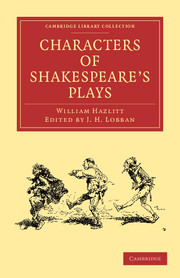Book contents
- Frontmatter
- Preface
- Contents
- Introduction
- Preface
- Cymbeline
- Macbeth
- Julius Cæsar
- Othello
- Timon of Athens
- Coriolanus
- Troilus and Cressida
- Antony and Cleopatra
- Hamlet
- The Tempest
- The Midsummer Night's Dream
- Romeo and Juliet
- Lear
- Richard II
- Henry IV
- Henry V
- Henry VI
- Richard III
- Henry VIII
- King John
- Twelfth Night; or, what you will
- The Two Gentlemen of Verona
- The Merchant of Venice
- The Winter's Tale
- All's Well That Ends Well
- Love's Labour's Lost
- Much Ado About Nothing
- As You Like It
- The Taming of the Shrew
- Measure for Measure
- The Merry Wives of Windsor
- The Comedy of Errors
- Doubtful plays of Shakespear
- Poems and Sonnets
- Notes
Love's Labour's Lost
Published online by Cambridge University Press: 07 September 2010
- Frontmatter
- Preface
- Contents
- Introduction
- Preface
- Cymbeline
- Macbeth
- Julius Cæsar
- Othello
- Timon of Athens
- Coriolanus
- Troilus and Cressida
- Antony and Cleopatra
- Hamlet
- The Tempest
- The Midsummer Night's Dream
- Romeo and Juliet
- Lear
- Richard II
- Henry IV
- Henry V
- Henry VI
- Richard III
- Henry VIII
- King John
- Twelfth Night; or, what you will
- The Two Gentlemen of Verona
- The Merchant of Venice
- The Winter's Tale
- All's Well That Ends Well
- Love's Labour's Lost
- Much Ado About Nothing
- As You Like It
- The Taming of the Shrew
- Measure for Measure
- The Merry Wives of Windsor
- The Comedy of Errors
- Doubtful plays of Shakespear
- Poems and Sonnets
- Notes
Summary
If we were to part with any of the author's comedies, it should be this. Yet we should be loth to part with Don Adriano de Armado, that mighty potentate of nonsense, or his page, that handful of wit; with Nathaniel the curate, or Holofernes the schoolmaster, and their dispute after dinner-on “the golden cadences of poesy;” with Costard the clown, or Dull the constable. Biron is too accomplished a character to be lost to the world, and yet he could not appear without his fellow courtiers and the king: and if we were to leave out the ladies the gentlemen would have no mistresses. So that we believe we may let the whole play stand as it is, and we shall hardly venture to “set a mark of reprobation on it.” Still we have some objections to the style, which we think savours more of the pedantic spirit of Shakespear's time than of his own genius; more of controversial divinity, and the logic of Peter Lombard, than of the inspiration of the Muse. It transports us quite as much to the manners of the court, and the quirks of courts of law, as to the scenes of nature or the fairyland of his own imagination. Shakespear has set himself to imitate the tone of polite conversation then prevailing among the fair, the witty, and the learned, and he has imitated it but too faithfully.
- Type
- Chapter
- Information
- Characters of Shakespeare's Plays , pp. 219 - 222Publisher: Cambridge University PressPrint publication year: 2009First published in: 1908

